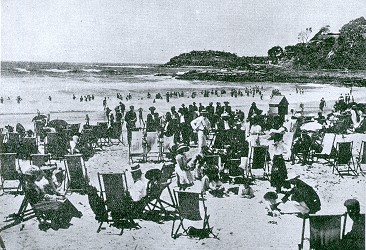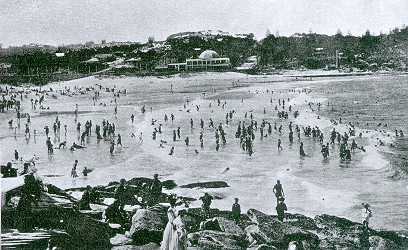 |
surfresearch.com.au
ford : australia, 1908 |
| home | catalogue | history | references | appendix |
|
Ford was possibly
influenced by Sydney's fledging surf lifesaving clubs on his visit there
in 1907-1908.
To consolidate their
public status, the clubs were actively petitioning their local councils
for the provision of beach front property, ostensibly in recognition of
their voluntary community service.
During 1907, the
precedent (one of many) was set by the Bondi Surf Bathers' Lifesaving Club
when it was granted permission to construct premises in the beachfront
park by Waverley Council.
The council also
contributed substantial funds, and the first Bondi clubhouse was operational
by October.
At Waikiki, Ford
would substitute voluntary community service with the conservation of a
traditional art, integrated with its promotion as a tourist attraction,
as the Outriggers' raison d'etre.
He wrote more than
half a dozen articles on surfriding between 1908 and 1926, mostly published
in Hawaiian, but some mainland US, magazines.
Ford was a principal
character, along with George Freeth, in Jack London's celebrated account
of surfriding at Waikiki in 1907.
Ford's onshore activites
are further detailed in Chairmain London's Our Hawaii (1917).
For extracts, see
Charmian London: Surfriding
at Waikiki 1907-1917.
I was arrested
at Manly Beach before I had even dipped into the breakers.
I had committed
the un-pardonable offence of sitting in the warm sand in my bathing-suit.
The policeman
who arrested me explained that I was subject to a fine of five pounds.
Of course, I
thought he was joking, and laughed pleasantly.
He didn't; and
it was only my plea that I was a stranger within the gates that got me
off with a warning.
I dipped into
the waves and shivered.
The water at
Manly is about the same temperature on Christmas Day as it is at Coney
on the Fourth of July.
I wanted to try
riding the waves on a surf-board, but it was forbidden- why I do not know,
for but a little corner of Manly is used by the bathers, and ...
Page 469
... here are rollers
everywhere in the bay- not long ones, it is true, but quite strong enough
for a Hawiian to come in for thirty yards or more standing on the crest
of a wave- and the white man has demonstrated at Waikiki that he can quickly
learn to beat he Hawaiian at his own game of walking upon the waves.
Manly Beach is
Known the world over; so are the rams sent forth broadcast of its shark
festivals and record-breaking cross currents.
Give an American
city of half-a-million population such a perfect beach, and either public
or private enterprise would construct a shark-proof iron fence across the
bay beyond the farthest rollers.
That this can
be alone is demonstrated by the almost mile-long iron piers at Coney Island
and at Atlantic City.
These have resisted
the surf for a generation.
Were there danger
of sharks at these resorts a few more cross-bars between the iron columns
would form a network through which no shark could force its way, but which
would not destroy the force of the surf.
A Hawaiian friend
of mine was once arrested at Atlantic City for steering an ironing-board,
upon which he stood erect, on the top of a billow, in and out among the
pillars and girders of the iron pier. There was no more danger of his striking
one of the bathers than there is that a body surfer at Manly will impale
one of the peaceful surfers at that resort.
However, both
in America and in Australia it seems that where you put a policeman you
must expect him to be at least as great a nuisance as the imaginary ones
he thinks he abates.
New Year's Day
I spent at Coogee.
If I had experienced
the frigidity of a New England Christmas at Manly, it was glorious Chicago
summer at Coogee.
Never have I
seen so many happy faces together outside of America.
It was America!
I have ...
Page 470
... seen women
and children take their seaside holidays with doleful pleasure at Scarborough
and at Margate, but everyone was happy at Coogee.
If there were
any ordinances prohibiting men and women romping in their bathing-costumes
upon the sands, they were happily violated a thousand times over.
Old folk became
young again; the ocean a fountain of youth, into which everyone dipped.
What if .oddlers
staggered about in Nature's garb?
They were happy
and no one seemed shocked.
No signboards
warned the masses that they were suspected of committing improprieties,
therefore improprieties seemed not to enter the heads of the happy throngs.
As an American,
how I envied Sydney her opportunities here!
For decades New
York neglected Coney Island.
To-day she is
paying millions for park privileges there that might have been hers, not
so long ago, for the mere asking.
A million people
go down to Coney Island every Saturday and Sunday during the summer months.
It is the one
cool playground of the masses.
To-day the beach
at Coney exists only where the city has laid out its park.
In Australia
there seems to be a better way of doing things.
I began the New.
Year by taking off my hat in admiration of the Australian way at Coogee.
A few hundred
private bathing stalls, please, and this place would be perfection.
Page 466
 |
AT MANLY, NEAR SYDNEY. |
 |
NEAR SYDNEY. |
 |
The Red Funnel, 27 Rattay Street, Dunedin, New Zealand. Volume VI, Number 5, June 1908 Pages 466 to 470. |

| home | catalogue | history | references | appendix |